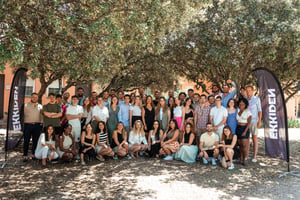A day in the life: Matías Saracusti, far away but always present
What is your job? How would you explain it to a toddler, for example? I am a freelance consultant working for the UN and I specialize in Azure Cloud...
One of the biggest challenges in creating a new company is the creation and structuring of its various departments.
Our CEO Geoffrey has recruited people to support him and, more importantly, to help him translate his vision of consulting into concrete actions.
Published in Our team

Melchior, Lead Generation Team Lead, joined the Ekkiden adventure in September 2021, and was given the task of building the sales department… from scratch.
An impressive challenge, which he continues to lead today. Here is his story.
'I joined the company as a Sales Development Team Lead. At the beginning, I was mainly learning the job of a SDR, how to prospect, how to source, how to deflect objections, the ABCs.'
'First, Geoffrey wanted me to meet the Paris team. I spent three weeks there to meet and get to know Bastien and Maxime [editor's note: Ekkiden's two directors of operations], so that they could train me in the SDR profession. I was also in charge of an intern in Madrid, Enzo, who was continuing the work of a former intern on email automation.
Then I did my first real recruitment and hired Antonin, a former member of my team, who had an engineer basis. He did his apprenticeship at the same time as the other trainees. We realised that we needed a database of contacts that Ekkiden didn't have, which was crucial for the transfer of information between sales and business. Together, we had to integrate Hubspot into Ekkiden's operations. It was a big task to implement a CRM to have a contact database to work with and provide information.
Then Louise joined us in November. We started by working on the calls. Then, with her and with all the rest of the team that joined me later, we spent a lot of time working on the SDR and the prospect of improving ourselves all the time.
The sales department has been built by learning from its mistakes.
Moreover, with the experience, I became better in the recruitment of my new team members and in their evolution management. After 6 months, as our operation had improved, I investigated this subject to redo it and offer a better onboarding for the new SDRs. As I was able to do less operational work, I had more time to accompany the recruitment and training with more pedagogy.
With a fast growing team, there is obviously a recruitment part to manage, but also its levelling, its onboarding, and its training. For each new joiner, I've encountered problems that I've had to address. For this year, I thought in terms of process above all: how to reproduce a solution for a problem, how to simplify life... It's only now that I'm able to rethink these solutions with the benefit of hindsight, to see what worked and what didn't.
What is certain is that we have evolved a lot. Today, we have moved to an aggressive approach: we go looking for candidates, whereas before we were mainly sorting applications. We can filter through LinkedIn and prospect.
During interviews, we now have a whole process that we have created to avoid possible recruitment problems, based on case studies, and role-playing for example. We have also set up a calculator to measure the qualities of the SDRs in interviews and to have the same basis for scoring when it comes to evaluating candidates.'
'I like to say that I recruit personalities who get along on the phone.
What interests me is their relationship to travel and sport.
For me, travelling is about opening up your mind, meeting other cultures and being curious, because that's what I've learned on my travels. I asked them why they were travelling, with whom, to do what. When I recruit interns, they usually don't have much work experience, and that's how they can make a difference.
Then I asked them what sport they were doing: individual or group? Why do they do it? For me, sport builds personality. I put myself in the clients' shoes: do they want to hear and listen to these people? What I was looking for was a tone, politeness, empathy, charisma, joy, motivation, a desire to learn and proactivity. I didn't want to be behind their backs telling them what to do, but rather creating a team that helps each other. If there is this basis, respect comes naturally, and you can discuss and question.'
'My engineering background has helped me a lot in structuring. The development of the department mainly came with the implementation of metrics. Initially, you always work to produce metrics. But you also must listen to your teams. We were able to adapt to what was happening in real time.
The subject that struck me most in this structuring was the recognition of the efforts made to keep the team motivated. When you work, you want to be recognized for it, and that's perfectly normal. So, we implemented metrics that reward effort and quality of work.
Also, the more I developed the department, the more important the relationship between business and sales became.
The Holy Grail is when the exchange of information is smooth.
To this end, we have implemented a scoring system for leads, to improve the relationship between our two departments. Communication is sometimes complicated because we operate in several countries at the same time. But it takes time to get everyone on the same level on processes.'
'Geoffrey gave me some books to read and said, "if you read them and are interested, I'll give you the job". I read 4 books on how to create and track a sales department. I was fascinated. Recruitment, inbound, outbound, I loved it! Then we got in touch and realised that we shared the same vision.
These four books were:
These books are references for me, and I always encourage my team to read them. They helped me define the onboarding of the sales team, how to maintain and develop their motivation, the metrics to follow, the chapters not to be missed... It also helps me to improve my management.'
'My tasks evolve according to the number of people in my team, the number of employees at Ekkiden and its ambitions. The processes I put in place must be scalable, because the more Business Managers there are, the more Community Builders that join us to support them. And at the same time, you have to increase the number of markets in which you operate. In short, you have to know how to choose your battles!'
'Very good, transparent, respectful, warm, and close.'
'I read a lot about it. Managing personalities is not an easy task. But working with many different personalities is very instructive. The more personalities I work with, the more I learn, the more I improve and the more I am able to solve problems.
As long as we respect each other, we can go anywhere, because we can question, we can disagree, and from there, there is understanding and trust.
That's how we can help each other and feel free to express ourselves. I always base myself on this reference scheme which explains the concept of radical candor.
-2.png?width=474&name=MicrosoftTeams-image%20(4)-2.png)
This is what I aim for in my management. We are all here to help each other, but also to improve each other, but to do that we have to be able to say things to each other.'
'In my opinion, our personal and professional development comes mainly from us in an entrepreneurial environment. There is so much information everywhere that you have to know how to find it in the right places.
I want my team to know how to take information, analyse it, categorise it, draw conclusions and above all communicate and share them with the team so that we can discuss them and learn from them collectively. On a professional and personal level, this forces us to source and argue our decisions. It takes work, but the team is very good at it.'
'Motivation, limitlessness, fulfilment, thirst for learning, team spirit.'
'We managed to build a good team and the results are showing. We are targeting the right people, and it is always a pleasure to see the evolution of the team and the metrics.'
What are the upcoming projects for the sales team?
'Communication and a common vision between the teams is becoming more crucial than ever for the future of Ekkiden.
Geoffrey and I want to create a real sales department, in which every person aiming for the position of Business Manager will eventually have to pass. The idea is to set up a kind of graduate program to avoid communication problems between departments by putting oneself in the shoes of others.'
Check out our Job offers page! You may be our new Melchior...

What is your job? How would you explain it to a toddler, for example? I am a freelance consultant working for the UN and I specialize in Azure Cloud...

Welcome to Ekkiden! Well, no, the story is a bit more complex than that....

'If I had to ask the Gabriela of 3 years ago where she would see herself...